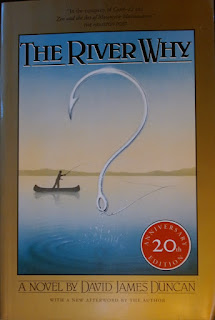This book review was written by Eugene Kernes
“It should surprise no one, then, that as a small child I became a “fishing prodigy” and am to this day not unjustly known as a “fishing genius.” It has been given to me to understand the way in which fish think; it is therefore as easy for me to catch fish as it is for a skilled huckster to swindle honest and innocent men. And anyone who thinks I brag in stating that I understand fish-thought is obviously ignorant of the way in which fish think. Believe me, it’s nothing to brag about.” – David James Duncan, Book One: Chapter 2: The Rogue River Fishing War, Page 13
“A fishing prodigy, like a musical prodigy, is perforce a solitary. Because of fishing I started school a year late; because of fishing I failed the fifth grade; because of fishing I was considered a kind of mild-mannered freak to my schoolmates; because of fishing I grew up osprey-silent and trout-shy and developed early on an ability to slide through the Public School System as riverwater slides by the logjams, rockslides and dams that bar its seaward journey.” – David James Duncan, Book One: Chapter 3b: Some Biographical Statistics, Page 17
“And so I learned what solitude really was. It was raw material – awesome, malleable, older than men or worlds or water. And it was merciless – for it let a man become precisely what he alone made of himself. One needed either wisdom or tree-bark insensitivity to confront such a fearsome freedom. Realizing now that I lacked both, I let myself long for company.” – David James Duncan, Book Three: Chapter 2: Neighbors, Page 148
Overview:
This is a book about a life devoted to fishing. An expert fisher from an early age. A fishing prodigy. A life devoted to just fishing, has consequences. For Gus has various problems because of this obsession to fish. It acts as an addiction. For everything else becomes sidelined, just to continue to fish.
Along the way, Gus provides contrasts and comparisons about
fish and water, with the broader context of philosophy and faith. There is even a personal traumatic
realization about what fishing means to the fish, to the river. For the river asks why. Forcing Gus to consider one’s actions. To find internal meaning and responsibility. The power of introspection can cause
behavioral change.
Caveats?
The book can be difficult to read,
as the topic transitions are poor and quick.
Fishing is a central theme of the book.
Readers who appreciate fishing will resonate more with the book.
